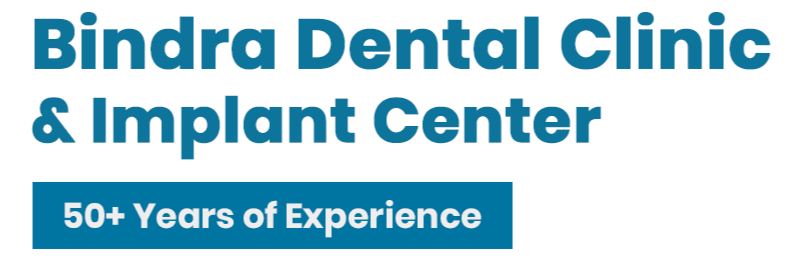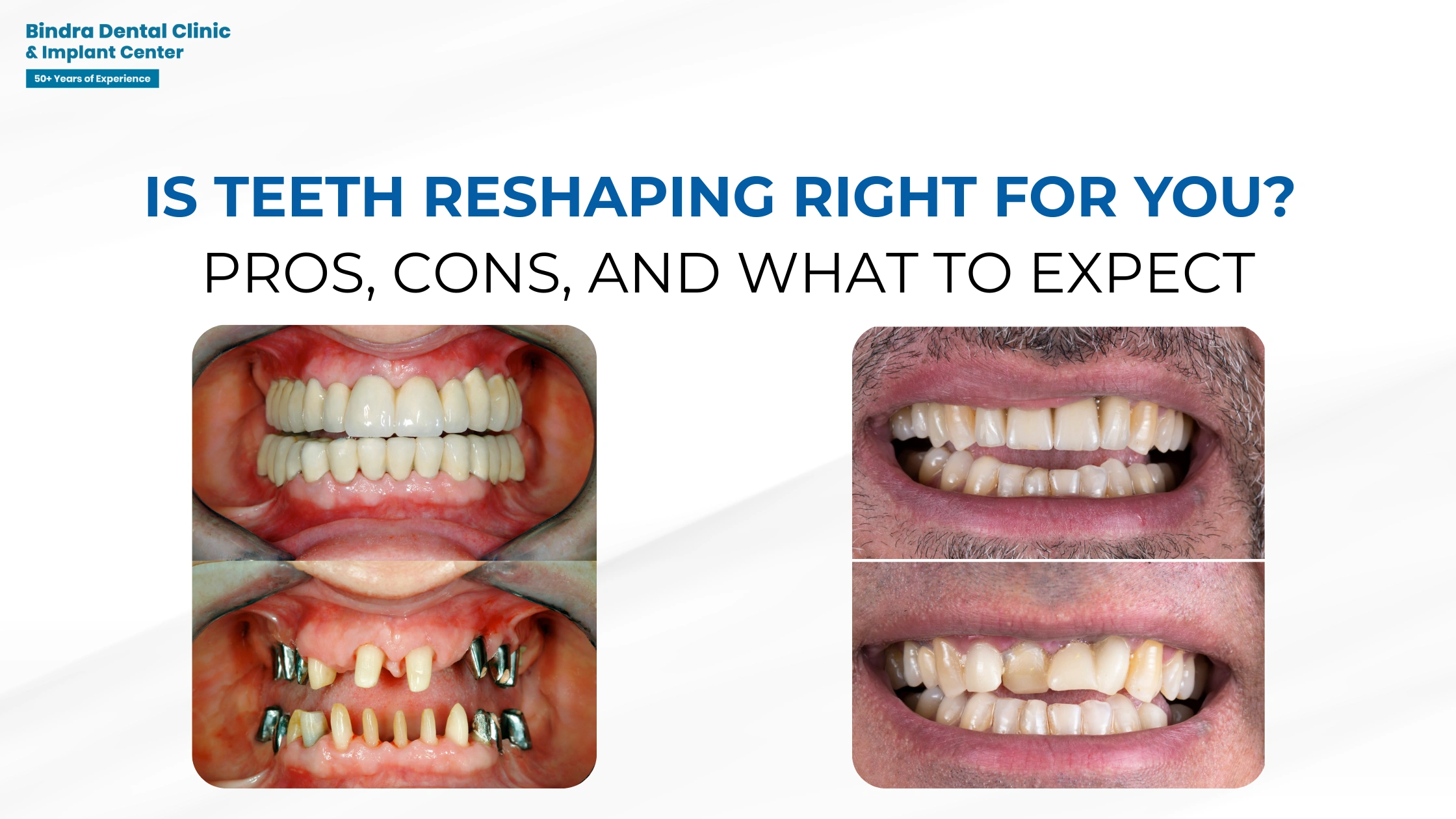Perfect smile is best known to have straight, symmetrical and well spaced teeth. Although orthodontics and veneers are common operations, dental contouring or teeth reshaping can be performed as an aesthetic and non-problematic alternative. However, is it the correct decision in your case?
Hi i am Dr Jasmeet Bindra, In this guide, I will give you an overview of what teeth reshaping is, its advantages and disadvantages, who it is most suitable to and what you can expect when undergoing such a procedure.
What Is Teeth Reshaping?
Dental contouring or teeth reshaping holds the possibility of driving teeth into transforming shapes, length, or surface of one or more teeth through the removal of tiny parts of enamel (exterior covering of teeth). With the aid of fine equipment like drills or lasers the dentists can carve and polish out any flaws on the teeth, producing a more balanced and beautiful smile.
It’s often used to:
- Smooth out minor chips or irregularities
- Shorten overly long teeth
- Round off pointed teeth
- Adjust slight overlapping or uneven edges
This process is often accompanied by dental bonding in which reshaping or filling gaps using tooth-colored resin is done.
Who Is an Ideal Candidate for Teeth Reshaping?
Reshaping teeth is most suitable to the persons who:
- Eminent minor cosmetic blemishes such as non smoothness or chips
- Wish to get minor corrections without long processions
- Possess good gums and adequate thickness of enamel
- Are on the hunt of a low-cost, easy fix in which to cosmetically fix something
Not suitable for:
- Individuals whose teeth are highly crooked are;
- People with caries, periodontal, or a thin enamel layer
- Individuals who wanted to make dramatic cosmetic improvements (veneers or braces are superior)
Your dentist will also take into account your dental condition as well as the thickness of enamel so that he or she might advise reshaping
Pros of Teeth Reshaping
There are some positive aspects of this common cosmetic process; I can discuss them as follows:
Painless and Non-Invasive
As enamel is not associated with nerves, the process generally cannot use any anesthetic and would not cause pain.
Instant Results
Reshaping is usually done during a single sitting which is occasionally at a time of half an hour; thus, it is perfect to make minor touch ups in the smile.
Affordable Option
Compared to braces, veneers, or aligners, teeth reshaping is one of the most affordable cosmetic dental procedures.
Improves Aesthetics Subtly
It can make teeth appear more uniform and symmetrical without altering your natural look too drastically.
No Recovery Time
You can return to daily activities immediately after the procedure—no downtime required.
Cons and Risks of Teeth Reshaping
Despite its benefits, there are a few limitations to consider:
Irreversible
With enamel being removed, this procedure cannot be reversed. Reshaping of the teeth beyond an extent seriously compromises on their integrity..
Limited to Minor Fixes
This procedure is compared with orthodontics or veneers and cannot help in making great dental improvements or structural alterations.
Increased Sensitivity
Removing enamel can sometimes lead to tooth sensitivity, especially to hot or cold beverages.
Not Covered by Insurance
Since it is considered a cosmetic procedure, dental insurance will generally not cover the expense.
What to Expect During the Procedure
Knowing what happens during a teeth reshaping session is bound to ease concern. So here’s what will happen:
- Examination and X-Rays:
Your dentist will examine your teeth. The X-rays would typically be used to assess enamel thickness and tooth health.. - Planning the Reshape:
The dentist will mark the areas to be reshaped and discuss the desired outcomes with you. - Reshaping the Teeth:
The areas to be reshaped will be marked, and from then on, the wants of the client in terms of how he/she wishes to look will be discussed with him/her in detail. - Polishing:
Once the ideal shape is achieved, the teeth are polished for a natural, glossy finish - Optional Bonding:
If needed, a tooth-colored resin may be applied to reshape areas or fill in small gaps..
The entire process usually takes 30 to 60 minutes, depending on the number of teeth involved
Cost of Teeth Reshaping
The cost of dental contouring varies based on location, dentist experience, and how many teeth require work
- Average cost per tooth: ₹1,500–₹4,000 approx, depending on the reshaping required
- Multiple teeth: May qualify for a bundled rate
Note: Because it’s a cosmetic procedure, it’s rarely covered by dental insurance unless medically necessary.
Alternatives to Teeth Reshaping
If reshaping isn’t suitable, you might consider these alternatives:
Dental Bonding
A resin is applied to teeth to correct shape and size, ideal for chips and discoloration.
Veneers
Thin porcelain covers that dramatically change the tooth’s appearance—used for more substantial aesthetic improvements.
Braces or Aligners
Used to fix misalignment, crowding, or bite issues. Offers functional and cosmetic improvement over time.
Final Verdict: Is Teeth Reshaping Right for You?
Me signing off sharing a final verdict that teeth reshaping is a speedy, low priced and secure approach to perfect your smile. It is perfect when one has minor aesthetic deficiencies, healthy enamel and wants to achieve discreet results but does not want to undergo complex processes.
Nonetheless, you should consult the dentist who will assess whether you are a good candidate. Your teeth problems might not be solved at a surface level, by a single layer, and you would require something deeper such as bonding, veneers and orthodontics.
Perhaps you are contemplating undergoing teeth reshaping, and that is why you should meet a qualified cosmetic dentist to get information on what you can do.
Popular questions (FAQs)
No, because it is painless, as it consists in the enamel only, which is not nerve-rooted.
The outcomes are long term because enamel is permanently eliminated. Nevertheless, they must be taken care of properly through oral care.
Minor crookedness can only be mejorated considerably. Braces or aligners are preferable when it comes to moderate to severe misalignment.
Small doses, yes. Acting as a qualified dentist, he or she will make sure that he or she will not put the tooth structure in jeopardy.
Yes! A lot of patients are satisfied with reshaping + bonding that allows them to improve form and functionality in a single visit.


